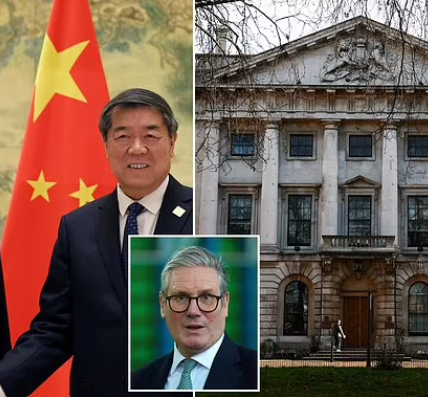Labour panic on Net Zero: Business Secretary says government has ‘heard’ backlash at EVs targets after Vauxhall’s Luton plant is SHUT and Ford boss demands more state help to boost uptake_Nhy
Labour’s Net Zero plans have been thrown into confusion as ministers voice ‘profound concerns’ about the impact of EV targets.
Business Secretary Jonathan Reynolds signalled an overhaul after Vauxhall announced plans to close its van-making factory in Luton.
Stellantis, which also owns Citroen, Peugeot and Fiat, said it would combine production at its other plant in Ellesmere Port.
The firm said Labour‘s eco policy fuelled the decision – which puts around 1,100 jobs at risk.
The government has now launched an urgent review of sales targets designed to accelerate the EV transition, following repeated warnings that they are putting jobs and investment at risk.
The managing director of Ford UK today said the car industry supports targets around electric vehicles but it needs Government-backed incentives to boost their uptake by customers.
Lisa Brankin said Ford has invested ‘significantly’ in the production and development of EVs, with ‘well over’ £350 million invested around electrification in the UK.
‘So we kind of need to make it work,’ she told BBC Radio 4’s Today programme.
In a speech to industry leaders in central London last night, Mr Reynolds admitted he was ‘profoundly concerned’ by how the EV sales mandate was working in practice.

Vauxhall parent firm Stellantis says it will close its Luton van factory (pictured) next year to consolidate production at its Ellesmere Port plant

Employees assemble the dashboards and steering wheels for Vauxhall Vivaro trucks on the production line at the Vauxhall plant in Luton

Ellesmere Port in Cheshire is already primed to produce electric vehicles. The move comes after Stellantis warned it may cut UK production in response to EV sales targets
He said the Vauxhall closure ‘only confirms what we knew about the scale of the challenges’ facing the industry.
The consultation will map out ‘a better way forward’ to achieve the broader goal of phasing out new petrol and diesel vehicles by 2030, he insisted.
Under the zero-emission vehicles (Zev) mandate, at least 22 per cent of new cars sold by each manufacturer in the UK this year must be zero-emission, with the threshold rising each year.
Under the current rules, the mandate will reach 80 per cent by 2030.
At present, car and van-makers will be slapped with fines of £15,000 per vehicle sold above the targets.
The Government has committed to bring the ban on the sale of new petrol and diesel cars and vans forward from 2035 to 2030, reversing a change introduced by Rishi Sunak’s government last year.
In his speech to the SMMT, Mr Reynolds said the Government was ‘absolutely committed’ to the 2030 target, but had ‘heard you loud and clear on the need for support to make this transition a success’.
Announcing a ‘fast-track’ consultation on changes to the Zev mandate, he said he was ‘profoundly concerned’ about how the policy was operating.
He said: ‘I’m going to be frank with you – I don’t believe the policies that we have inherited, and I mean specifically in relation to zero-emission vehicles, are operating today in a way anyone intended them to.’
The consultation is not expected to result in changes to the Zev mandate’s percentages, but could include amendments to the options for how manufacturers who miss their targets can avoid being fined.
The 2030 ban will mean firms cannot sell pure fossil fuel cars, but they will be able to continue selling hybrids until 2035.
Figures from the SMMT showed fully electric cars made up 18 per cent of new sales in the first ten months of this year – below the 22 per cent target for 2024.
Society of Motor Manufacturers and Traders (SMMT) boss Mike Hawes has warned that the sales threshold could cost the industry nearly £6billion this year alone.
Some £2billion will be fines that are expected for car makers who failed to hit this year’s zero-emission vehicle sales share.
The remaining £4billion is from discounting EV prices in an effort to stimulate sales.
Speaking at the trade body’s annual dinner on last night, Mr Hawes told an audience: ‘Jobs are on the line.’
Major industry players, including Ford, Nissan and Stellantis, have been warning for weeks that the rules could have an ‘irreversible impact’ on UK car production.
Earlier this year, Stellantis boss Carlos Tavares warned the future of both Luton – which has been making vehicles for 120 years – and Ellesmere Port were in doubt.
When Labour entered No 10 in July he announced a review of the future of both plants while citing the impact of the EV sales mandate. Car-makers are already being forced to cut jobs because of plummeting sales of EVs to private motorists and after Labour hiked employer National Insurance contributions in its Budget.
Rachel Hopkins, Labour MP for Luton South, said the closure was ‘deeply troubling for our town’, adding: ‘Luton depends on these high-quality manufacturing jobs to drive local growth and support national prosperity.’
And Tories stepped up condemnation of Labour’s approach last night.
Lord Frost warned Labour’s ‘crazy pursuit of net-zero on an accelerated timetable is going to do real damage to the economy and to the living standards of everyone in this country.’
Tory MP Greg Smith added: ‘The Government appears to have discovered there is such a thing as a market – and EVs are proving very unpopular with real consumers.’

Research by This is Money suggests some of the biggest car firms and groups are falling behind on targets for battery electric vehicle sales

Business Secretary Jonathan Reynolds pictured leaving Downing Street earlier today. He said today was a ‘very difficult day for Luton’

The Vauxhall Luton plant is located just one mile from Luton Airport (pictured in 2002)
Government sources said while the Zev percentage hikes for each year are likely to remain, fines could be drastically reduced from £15,000.
Manufacturers may also be allowed to include exports and sales abroad within the targets. Another possibility is to equalise the proportion of cars and vans included in the targets.
However, sources stressed that the separate target of banning sales of new petrol and diesel cars by 2030 will remain in place.
It is the latest blow to Labour’s plan to grow Britain’s economy. This week it was accused at the CBI conference of treating business like a ‘cash cow’ to be ‘milked’ with its NI raid.
A government spokesman said: ‘We have a longstanding partnership with Stellantis and will continue to work closely with them as well as trade unions and local partners on the next steps.’



